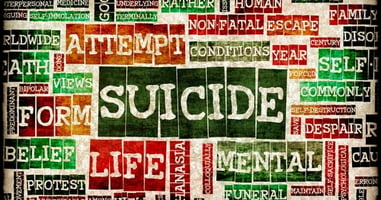Psychosocial Care Credited for Declining Suicide Rate Among Patients With Cancer

In contrast to the overall rise in U.S. suicide rates since 2000, the suicide rate among people diagnosed with cancer has been dropping since 1989, according a report in Translational Psychiatry. The authors suggest that improvements in psychosocial care for patients with cancer is partially responsible for this decline.
“The cancer-related suicide rate is estimated to be double that of the general population in the United States. Notably, the risk of suicide in men is significantly higher compared to women. This heightened cancer-related suicide risk remains elevated for up to 15 years following their diagnosis,” wrote Qiang Liu, M.D., and colleagues at the National Cancer Center at the Chinese Academy of Medical Sciences and Peking Union Medical College in Beijing, China.
Liu and colleagues analyzed a population database of nearly 5 million Americans who were diagnosed with cancer over a 40-year span to determine age-adjusted rates of suicide from 1975 to 2017. Lui and colleagues found that among the 8,114 cancer patients who died by suicide, the vast majority were male (82%), Caucasian (93%), and older (73% were between 50 and 79 years).
Among the overall U.S. population, average suicide rates increased 1.7% a year since 2000, researchers reported. By contrast, average cancer-related suicide deaths declined gradually between 1989 and 2013, followed by a sharper decline between 2013 and 2017, during which the rate dropped 27% a year on average.
“In addition to the promising advances in medical treatments for malignancies, this period witnessed an evolving role of psycho-oncology care, palliative care, and hospice care, leading to the promotion and increased utilization of these services by patients with cancer, enhancing their overall quality of life. Furthermore, the development of integrated care models, including collaborative care models, has provided a more comprehensive and coordinated approach to cancer care,” the researchers wrote.
For more information, see the Psychiatric News article “Integrated Care Improves Depression Symptoms in Cancer Patients.”
(Image: Getty Images/iStock/Caiaimage/SDI Productions)
Psychiatric News Seeks Contributions From Members
New Editor in Chief Adrian Preda, M.D., invites APA members to become involved in Psychiatric News by writing news or opinion articles on the topic of their choice or by applying for leadership positions to invite and curate articles from other members in new sections that include the areas of technology, sex and gender issues, advocacy, psychotherapy, integrated psychiatry and primary care, and consultation-liaison psychiatry. Interested? For more information, send an email to editor@psych.org.





